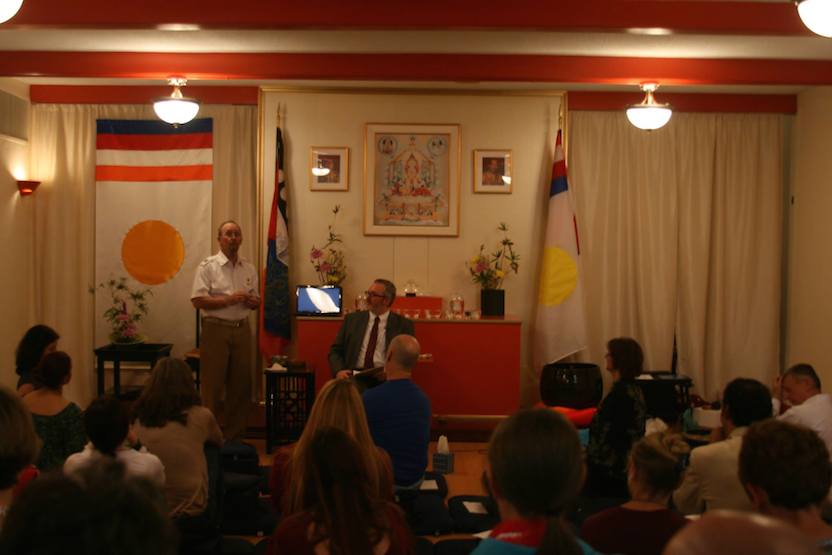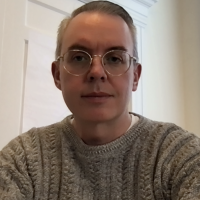There is a phenomenon I would like to explore that involves a person beginning and traveling a meditative or yogic path that is in complete contradistinction from the spiritual or religious position of their family and upbringing.
Maybe Westerners who have become Buddhists or serious yoga practitioners can likely relate to being the odd person out, so to speak, in their families.
Speaking of my own experience, in the past decade I feel that I have undergone vast and profound changes as a human being.
The process and the result of what has happened to me can be described, I believe, in many positive ways. I have become more gentle, kind and content. I am able to appreciate my precious human birth, the results of making appropriate choices, the fragility and ephemeral nature of life and the futility of my past actions and suffering causing behaviors.
When I am in the environment of the practice container, or by myself, or with other practitioners it is very easy to relax into an experience that is mindful, aware and of benefit to others.
I saw a quote on Twitter once, and I do not know the context, but it was something Trungpa Rinpoche once allegedly said that was something to the effect that it’s possible to be enlightened everywhere except when with our families. It made me chuckle and I responded with, “I can relate to that.”
Not that I am talking about actual enlightenment, whatever that even means, but the sentiment rings true.
Although I have generally good relationships with my family (which primarily means my mother and two children), there is a ton of residual conditioning of a time when I was less…enlightened.
When I am with my family, it is really easy to fall into old patterns of unskillful communication and attitudes. I am more aware now and can avoid pitfalls much more than before, but the old style of relating comes up more frequently than in any other situations.
This may all seem rather obvious thus far, but I’m coming to the point.
There may be a tendency to think that how we are in this heavily conditioned relationship is who we really are. But, I would like to posit that who we appear to be, and manifest as, in these oldest of relationships is the least like who or what we actually are.
After my intensive period of growth and change, heavily grounded in the practice of sitting meditation, I believe that who I am most fundamentally is a reflection of what we call in Shambhala—basic goodness.
There is an experience that I often am able to open into during practice, retreats and being with others on the path that is an experience of relaxing the ego and conditioned story of myself and realizing a peace, spaciousness and fundamental sense of wholeness and equanimity that I feel is most like who “I” actually am.
This experience, as I practice more and more, permeates into my life to more and more of an extent. It is somewhat becoming my baseline experience. In some sense it is extremely ordinary and unspectacular, but in contrast with my experience of 15 years ago, the transformation is rather astounding.
However, it is not continuous and all of my old patterns are not completely washed away.
In interactions with my mom, for example, the old patterns of irritation and aggression as a reactionary response are more likely to come up at any given time. And although my mom is a basically good and extremely generous person, she is not a practitioner and is not training to see things as they are in the present.
When she sees me she is not seeing who I am at this moment, but she is seeing me through a lens of a lifetime of patterns of behavior. I also, for sure, am not usually seeing her as she is in this moment, but also how she has always been.
This is something I am working with on a moment to moment basis, but that is not the point I am trying to make right now either.
(This, also, has nothing to do with blame.)
She likely does see me as a somewhat different person than I was 10 years ago, but maybe much the same. If she had come in at the end of the weekend retreat I helped lead a few weeks ago and heard the coordinator say that I was the most gentle man she had ever known, my mother probably would have involuntarily grunted with laughter.
There are probably many of you that could tell very similar stories about your family and how they relate to you after your years of practice and opening into your more natural being.
Our families likely think that they know the person we are and have always been, and that we are somehow acting a certain way in front of other people…but that it’s not really us. And this feeling whether it is directly stated or not probably affects many of us. We might, at some level, believe it to be true.
But, again, I believe that rather than being who we “really are,” it is really just a bundle of patterns, an auto-pilot like reaction, a Groundhog Day repetition of a loop of a rather uninteresting and uninspiring movie. Is that who we really are? I don’t think so.
I believe I have experienced who I really am to some degree, which isn’t so much of an I at all, during my practice when I am able to let go of all impulses to do anything other than rest in the natural space and wisdom of the present moment. And more and more I gain trust in the fundamental goodness and it, more and more, leaks into my post-meditation day.
What is required to really change those most deeply ingrained patterns is a radical commitment to break our old habits—to not bite at the bait in front of us. All of us in this position have experienced the moments when we have not returned the volley and how that has affected the person serving (or not have sent the first serve ourselves).
If we want to fundamentally change those relationships we have to develop more trust in our basic goodness, so that our experience of it is as omni-present as we know intellectually that it is, so that we cannot be moved from that seat of openness and kindness.
At times we will fail, and when that happens, we can practice to drop it immediately and be there for that next moment, awake, present, and embodying our most innate qualities of love, compassion and wisdom.
Love elephant and want to go steady?
Sign up for our (curated) daily and weekly newsletters!
Photo: Author’s own
 Share on bsky
Share on bsky


Read 5 comments and reply